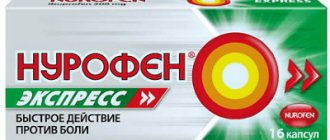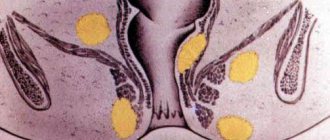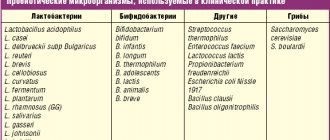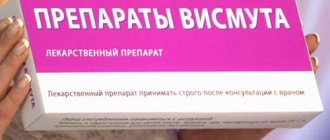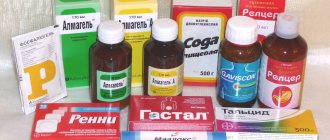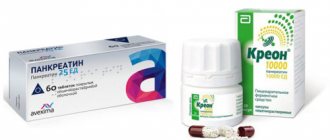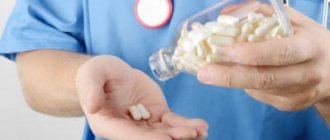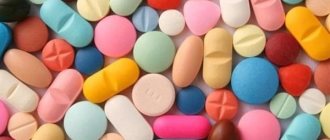Created: 02.27.2019
Updated: 02.24.2021 17:56:38 Share:
Author of the article: Pogrebnoy Stanislav Leonidovich
*Review of the best according to the editors of expertology.ru. About the selection criteria. This material is subjective in nature, does not constitute advertising and does not serve as a purchase guide. Before purchasing, consultation with a specialist is required.
The digestion process is inevitably accompanied by the release of gases, and a healthy adult releases about a liter of them every day, in small, periodic portions. Typically, the volume of an average serving is about 100 milliliters. But in some cases, this volume increases significantly and begins to bother the person, even to the point of developing pain.
There is a misconception that intestinal gas consists entirely of hydrogen sulfide, but this is not entirely true. Indeed, the smell of rotten eggs is sometimes inherent in intestinal gas, but the human sense of smell is able to detect hydrogen sulfide even in very small concentrations. The main components are nitrogen, carbon dioxide, methane and oxygen. Mercaptans and hydrogen sulfide are also present in small quantities.
Gases in the intestines are not at all in a free state, and do not bubble over its different parts. Typically, gas bubbles are in the form of foam, which is located along the intestinal walls, and they rarely penetrate into the intestinal contents. This is important because the work of some drugs to combat excess gas formation, which are called defoamers, is based on physical effects.
The reasons why flatulence occurs are varied. In adults, this is most often the result of poor diet and swallowing air. This happens when smoking, chewing gum, and also if a person has a bad habit of eating on the go. Excessive consumption of beer, kvass and carbonated water leads to increased gas formation. Among foodstuffs, bloating is caused by legumes, and especially peas.
In some cases, the cause of flatulence is hereditary factors, such as congenital lactase deficiency. If a person consumes a lot of sweet foods, then they begin to ferment in the intestines, and during fermentation, as is known, a large amount of carbon dioxide is released.
Excessive gas formation in itself is unpleasant, but does not cause much discomfort. But quite often, bloating leads to discomfort and pain in the abdomen, and therefore significantly impairs the quality of life. This rating includes modern and safe drugs that can successfully combat excess gas formation. These are enterosorbents that work as gas absorbers, defoamers that change the physical properties of bubbles, enzyme preparations that help process the substrate as best as possible, depriving microorganisms of a nutrient medium for gas formation. Also included in the rating are eubiotics, or bacterial agents. Let's take a closer look at them.
No. 10 – Pepphys
Price: from 70 rubles
This is a combined drug for bloating, which normalizes digestion processes due to the enzymes it contains. This remedy can be used for the following symptoms: liver disease, chronic pancreatitis, overeating, flatulence, increased formation of gases after surgery, dyspepsia, preparation for x-rays or ultrasound. Pepfiz contains digestive plant enzymes that facilitate the absorption and digestion of carbohydrates.
The drug should not be used during lactation and pregnancy. It is contraindicated in people hypersensitive to the components of this product. In addition, Pepfiz should be taken with extreme caution by those who have any kidney or liver diseases, as well as arterial hypertension. Contraindications to the use of this product are for children under twelve years of age.
Simethicone with fennel caps
Relax safely!
However, even if after the diagnosis we were not diagnosed with any disease of the digestive system, this is not at all a reason to ignore flatulence. Moreover, even flatulence itself is quite painful for the patient, since the accumulating gases lead to bloating or attacks of cramping pain such as colic. It is also often accompanied by dyspeptic disorders: nausea, belching, loss of appetite, constipation or diarrhea, bad breath and rumbling in the stomach, as well as the urge to defecate, which simply cannot be restrained, and the uncontrolled release of gases.
Agree that with such a “set” it is difficult to lead any active lifestyle, which implies a full-time working day, including the need to travel by public transport, spend 8 hours at a time in the workplace among colleagues, go on business trips, attend long-term meetings or attend negotiations . Not to mention free time and personal life - after all, in a home environment, with your family, you want to relax in every sense. However, the results of such relaxation are unlikely to be perceived with understanding by others...
What then happens - to endure it at work and at home, and during breaks, go out to the open balcony? Or rely on the patience of your loved ones and hope that the expression “they were blown away by the wind” is not about you?
The opportunity to live fully and relax when you want, without consequences for relationships in the family and team, without becoming an object of ridicule and the owner of the nickname “Thunder in your pants” - all this allows ESPUMIZAN®. Effective and safe.
Why is it effective? We talked about this in detail above. Why is it safe? Because it is inert and is not fermented by microorganisms, is not absorbed in the digestive tract and is excreted unchanged, and also does not penetrate the systemic bloodstream and does not cause adverse reactions.
In addition, ESPUMIZAN®, unlike enterosorbents, does not absorb food components and medications, does not affect the biochemical processes of digestion and absorption: it does not in any way affect the metabolism of proteins, fats or carbohydrates, and does not interfere with the absorption of vitamins, minerals and microelements. At the same time, due to the defoaming effect and reduction of gas content in the intestines, ESPUMIZAN® indirectly affects the normalization of digestive functions.
ESPUMIZAN® is safe, available without a prescription and can be used not only in adults and children over 6 years of age, but even in very young children from 1 year of age. For this purpose, two forms of the drug were developed: in the first case, patients will benefit from ESPUMIZAN® in capsules, in the second case, ESPUMIZAN® L in the form of a suspension.
ESPUMIZAN®: get rid of flatulence without second thoughts!
Press service of “APTEKA Weekly”
No. 9 – Antareit
Price: from 179 rubles
Antareit is a combined modern drug, the pharmacological action of which is determined by the characteristics of the components that make up its composition. The product has an adsorbent, increased antacid, carminative and enveloping effect. Indications for use are a number of symptoms that are directly related to an increase in the level of acidity of gastric juice, as well as heartburn, stomach pain, a feeling of constant heaviness and fullness, flatulence, and dyspepsia.
Antaret can be taken by adults and children over twelve years of age. When taking it, it is extremely important to take into account the likelihood of allergic reactions caused by individual hypersensitivity to the active substances that are part of the antagate.
Antareit
No. 8 – Meteospasmil
Price: from 430 rubles
Meteospasmil is a combined innovative drug that has an enhanced antispasmodic effect. It can significantly reduce gas formation in the intestines. This remedy is often used in preparation for ultrasound, X-ray, and instrumental examination of various systems and organs, as well as due to the presence of functional disorders of the housing and communal services, abdominal pain, permanent nausea, increased gas formation, unpleasant belching and diarrhea.
When taking it, all kinds of allergic reactions are quite likely. Among these are swelling of the larynx, urticaria and shock. Meteospasmil should not be used by children under fourteen years of age, or in cases of individual intolerance to the active components that make up its composition. In addition, the medicine should not be taken during pregnancy and lactation.
Simethicone
Do you want to talk about it?
Gas formation in the intestines is not only very common, but also a completely normal physiological phenomenon, the same as breathing or sweating, and is observed not only in humans, but also in many other mammals.
Thanks to one of the studies, which involved 11 Americans, it was possible to record how and in which parts of the intestines gas formation occurs. Thus, during the process of fermentation, hydrogen and carbon dioxide are formed in the right (ascending) section of the large intestine, and during the process of decay in the left (descending) section, hydrogen sulfide and methane “mature”. The role in the formation of the latter was relatively recently established for the bacterium Methanobrevibacter smithii, which lives in our intestines. Its main task is the absorption of hydrogen, an increase in the concentration of which in the intestines reduces the efficiency of microbial fermentation, and conversion into methane. Next, all these gases are mixed with nitrogen and oxygen, which are part of the air that enters our stomach (and then into our intestines) during food intake.
Thus, when absorbing and digesting an average lunch, about 15 liters of gases are formed. However, only a small part of them directly goes “free” - a larger amount of gases still penetrates through the intestinal walls into the blood, after which it is released with exhaled air through the lungs.
The frequency of gas discharge, as well as their composition, varies from person to person. For many, flatulence (this is what the release of intestinal gases is called) occurs only a couple of times a day, for others - up to several dozen; however, the average frequency is up to 15 times per day. The volume of intestinal gases is no less individual - it ranges from 0.1 to 2.1 liters per day.
If the distribution of gases in the intestines occurs evenly, their pressure is so low that flatulence occurs completely silently. However, even a slight imbalance in the distribution of gases (for example, eating foods rich in polysaccharides - beans, lentils, dairy products, onions and garlic, radishes, cashews, cabbage, etc.) in the intestines leads to pressure under which they are released from sharp sound (so-called sphincter resonance).
For many years it was also believed that the unpleasant odor of exhaust gases was due to skatole and indole, formed as a result of the decomposition of protein products. However, a study conducted in 1984 demonstrated that the presence of sulfur-containing compounds such as methanethiol, hydrogen sulfide, and dimethyl sulfide caused the malodor.
No. 7 – Simethicone
Price: from 199 rubles
The complex action drug is presented in several dosage forms - drops for oral administration, suspension, capsules, tablets, and emulsion. It can be used as a carminative, for the accumulation of gases and increased gas formation, during preparation for the diagnosis of the pelvic and abdominal organs (primarily, we are talking about sonography and radiography), as well as for surfactant poisoning. But there are also contraindications. Among these are intestinal obstruction, increased personal sensitivity, and all kinds of obstructive diseases. When taking the product in adults, allergic reactions are quite likely.
Simethicone
No. 6 – Disflatil
Price from 290 rubles
Disflatil is presented in the form of drops intended for internal use. In appearance, the drug is a milky-white emulsion of uniform consistency with a characteristic pineapple smell. The active substance here is simethicone, and the auxiliary ones are various preservatives. The principle of operation of the product is as follows: it physically destroys the accumulated gas bubbles, which are subsequently eliminated naturally.
This remedy is used in the case of symptomatic treatment of various types of accumulation in the gastrointestinal tract of excessive gas formation. We are talking mainly about flatulence, bloating, and aerophagia. There are a number of contraindications: you should not take the drug if you have intestinal obstruction or are highly sensitive to its components. When taking the product, do not forget about the need for dosing, taking into account your age. Disflatil is considered absolutely safe. It does not lead to any side effects, since it does not lead to the absorption of active substances. Of course, with individual hypersensitivity, an allergic reaction is likely to develop.
Simethicone
No. 5 – Sub Simplex
Price: from 321 rubles
Sab Simplex is a suspension intended for internal use. It is tear-viscous and has a fruity smell. This remedy reduces flatulence. The principle of action is concentrated in the following: the drug reduces the tension of gas bubbles that have formed in the intestinal mucus and directly in the contents of the stomach. The gases that are released are removed or absorbed by the intestinal walls. The drug is taken when all kinds of detergents enter the stomach (they cause acute poisoning), during the preparatory stage for diagnosis (ultrasound, radiography), and also as symptomatic therapy for manifestations of flatulence and increased formation of gases.
Sub Simplex
Years of painful flatulence
Alexandra
May 19, 2020
Hello! Please help me. For 12 years now, every day, I emphasize, every day, without any remissions, I have been suffering from severe flatulence, and gases are constantly being formed and rapidly expelled (in the morning, during the day, and at night). And I feel like I don’t go to the toilet all the way, so I’m constantly pressing (this is true, the large intestine remains tight and clogged, although I have bowel movements every day). No pain, no spasms. Although over the last couple of years I have begun to feel my stomach (it is also full, heavy, and rare short-term pain has appeared, but it is not particularly disturbing). From any food or liquid. Carbohydrates (fruits, vegetables) are absolutely terrible. Until I was 19 I had no problems with digestion. Then I started taking birth control pills and after 2 months I gradually began to experience constipation, and then flatulence began and did not go away (although I stopped taking OK after 8 months - many side effects began). During these 12 years, I graduated from university, got married, gave birth to twins, and changed two jobs. But the symptoms remained the same and stable. I am a consulting psychologist by training. I don’t notice the influence of the psycho-emotional factor on the symptoms. Moreover, there are no spasms. During this time, I visited many specialists and performed many tests. There is no diagnosis as such (on top of gastritis, helibocater, biliary dyskinesia, nematodes, dysbacteriosis, candidiasis, just nerves) - everyone diagnosed one thing and treated it. What was found in the tests: 1. Colonoscopy - normal. 2. Examination by a proctologist - grade 2 rectocele (can cause stool retention, but not flatulence, the proctologist said) 3. Feces - at different times: trichocephalus (treated several times with nemazol), candida in almost every analysis in all years + once black mold ( the doctor did not emphasize this), the absence of enterocci at all, the lactobacilli are increased. Now, once again, I am focusing on the treatment of candida - so far no changes. 4. Gastroscopy - slight reflux of bile 5. Ultrasound of the abdominal cavity - everything is normal, only there is a bend in the gallbladder 6. Thyroid hormones are normal. 7. Helicobacter was found, treated - repeated analysis a year later - it was gone. 8. Blood test for Giardia and parasites (main) - negative I took a bunch of pro- and prebiotics, enzymes, antibiotics and mycotics, duspatalins and meteospasmils, ursosan (by the way, 15% of it improves, but not always), flucanosols and pimafucins, fluanxol (such as nervous). The only thing that caused the symptoms to completely disappear over the course of 12 years was for 5 days - after the second part of the course of nemozol, then they prescribed Paragon - and everything started to swell again. And during these 5 days, the intestines were completely emptied, and there was no gas at all. And no diet. I don't know what to do anymore. I'm tired of living like this. I am looking for a job only with special conditions, I hardly go to visit, my husband and I sleep separately. And in sex it’s also very unpleasant, you almost turn the wrong way, you have to hold back the gases. One continuous torment. With respect to you, Alexandra. Be healthy!
Age:
31
Chronic diseases:
Chronic migraine and gastrointestinal disease, for which there is still no diagnosis
The question is closed
gases
flatulence
No. 4 – Kuplaton
Price: from 273 rubles
Kuplaton is produced in two versions: in the form of oral drops and capsules in a plastic bottle. The product belongs to a special group of polysiloxanes. Such substances have an enhanced surface-active effect. The principle of operation of cuplaton is as follows: it reduces surface tension. As a result, gas bubbles merge into large formations. This, as a result, allows intestinal gases to be eliminated. Accordingly, the drug reduces flatulence, regardless of the reasons that caused it. We are talking about swallowing air and the fermentation process. In addition, the product reduces the feeling of constant bloating and unpleasant rumbling, severe pain, and increases the efficiency of gas removal.
Espumisan caps. 40mg №50
Helpful Actions
- Carminative. The drugs reduce the tension of gas bubbles in the nutrient suspension and mucus of the gastrointestinal tract. They are being destroyed. Small bubbles merge into larger ones. The released gases are removed with the feces during peristaltic waves. Some of the bubbles are absorbed by the intestinal walls. As a result, the feeling of heaviness and fullness in the abdomen decreases, belching goes away, and the process of removing gases is normalized.
- Antispasmodic. Carminatives reduce the contractile activity of the intestinal wall and reduce peristalsis. Spasmodic pain (colic) and rumbling in the stomach disappear. The anal sphincter muscles relax and intestinal gases are freely expelled.
- Anti-inflammatory. Plant components (chamomile, dill, anise), which are part of natural carminative preparations, have an antimicrobial effect. They eliminate foci of infectious inflammation in the digestive tract and eliminate pathogenic microorganisms. The intestinal factor of the body's immune defense is restored due to the growth of beneficial bacteria.
- Digestive. Plant materials (chamomile, ginger, cumin, dill) and enzymes in some carminatives help increase glandular secretion and activate intestinal motility. The processes of digestion and absorption of nutrients are improved. Consequently, dyspeptic manifestations (belching of swallowed air, rumbling and a feeling of heaviness in the stomach, a feeling of fullness in the stomach, and others) pass.
- Enveloping and antacid. There are combined carminative drugs that contain two chemical compounds. One of them is aimed at eliminating the symptoms of flatulence. Another substance reduces the hyperproduction of hydrochloric acid by the stomach, that is, it is an antacid. A protective layer is formed on the surface of the mucous membrane of the digestive organs. It prevents inflammation and the aggressive effects of acidic contents on the esophagus, stomach and intestines. Such drugs effectively cope with heartburn and epigastric pain. They help reduce inflammation during gastroduodenitis, and reduce the likelihood of reflux - the reflux of acidic stomach contents into the esophagus or duodenum.
Read on the topic: What causes fermentation in the intestines and how to get rid of it?
No. 3 – Simikol
Price: from 179 rubles
Simicol is a homogeneous translucent liquid that contains silicon dioxide. The product has a characteristic gray color and is insoluble in water and alcohol. Simikol is produced in several versions - emulsions, capsules, drops, as well as in the form of chewable tablets and suspensions. Important properties of Simicol are inertness and complete absence of toxicity.
The principle of operation of Simicol is as follows: it eliminates gas bubbles and prevents the formation of new ones that form during flatulence in the intestines. In the future, such bubbles are quickly removed from the human body naturally. This modernized drug is not prescribed in cases of hypersensitivity to the active substances that are included in its composition, as well as in situations of individual intestinal obstruction. Please note: only a doctor can dose the drug and determine the duration of the treatment period. In addition, it is important to take this drug at night.
Simikol
List of drugs
Carminatives
- "Espumizan" is a medicinal product for oral administration based on simethicone (antifoam). This chemical reduces the surface tension of disintegrating gas bubbles in the intestinal contents and promotes their free excretion from the body. The drug is produced in the form of an emulsion (bottles of 30 and 50 ml), drops (30 ml per bottle), capsules (25 and 50 pieces per package) and granules. Espumisan is prescribed after breakfast, lunch and dinner, or during meals, 3 to 5 times a day. Recommended doses of the drug per dose: school-age children and adults – 1-2 capsules. The duration of therapeutic treatment is determined by the severity of pain and continues until intestinal spasms are relieved. For infants and young children, the drug is prescribed only in the form of an emulsion: 5-10 drops per single dose. For ease of use, Espumisan is mixed with food or formula (breast milk, water) in a bottle. Espumisan is permitted during pregnancy and breastfeeding.
In preparation for diagnostic procedures (radiography of the abdominal cavity, sonography, endoscopic manipulations (FGDS, colonoscopy, sigmoidoscopy)), the drug should be taken one day before the start of the study (after breakfast, lunch and dinner), as well as in the morning on the day of the test in an age-specific dose.
- "Sab Simplex" is a medicinal product for oral administration based on simethicone. Available in the form of a suspension (30 ml bottle). The drug is prescribed during or after meals, sometimes before bedtime. The daily dose is divided into 3-4 doses. For infants under 1 year of age, the suspension is mixed in a bottle with breast milk or formula. Single dose – 15 drops. For children of early and preschool age, Sub Simplex is prescribed in the same amount. From 6 to 15 years of age, the drug is recommended to be used in a single dose - 20-30 drops, for adults - 30-45 drops. Before use, the bottle of suspension must be shaken thoroughly.
For diagnostic procedures (radiography and ultrasound of the abdominal organs), the drug is prescribed in the evening the day before the examination. You need to take 3-6 teaspoons of the suspension. For ease of dosing, you need to remove the dropper cap from the bottle. Before the ultrasound (3 hours before the examination), take an additional 3 teaspoons of the drug. For endoscopic procedures, you need to drink 0.5-1 teaspoon of the suspension right before the procedure.
- "Almagel NEO" is an antacid drug with simethicone. Fights increased acid-forming function of the stomach and flatulence. The drug is available in the form of a suspension (170 or 200 ml bottle) and sachets (10 ml each, 10 or 20 pieces per package). Almagel NEO is prescribed an hour after breakfast, lunch and dinner, as well as before bedtime. The permissible single dose is 2 measuring spoons or 1 sachet. The drug is approved for use in children, but only from 10 years of age. Admission conditions are the same. The duration of treatment for gastritis with high acidity and dyspeptic symptoms (heartburn, bloating, pain) is from 2 weeks to 1 month. The suspension is taken in its pure form and is not washed down with water for half an hour.
Be sure to read: In detail about dysbiosis and methods of its treatment (diet, medications)
Antacids reduce the effect of some drugs. Therefore, it is important to maintain a gap of 1-2 hours between doses of different dosage forms.
- "Meteospasmil" is a combination drug with simethicone. It has an antispasmodic effect, reduces the production of gases in the intestines. The drug is available in 30 capsules per package. Prescribed orally before breakfast, lunch and dinner. The permissible single dose is 1 capsule. Contraindicated for children under 14 years of age.
- "Plantex" is an antispasmodic drug based on plant raw materials. Contains essential oil and fennel fruit extract. Available in bags (5 g each, 10 or 30 pieces per package). The drug relieves intestinal colic, improves digestion, and suppresses excess gas formation. Used in infants up to one year old, 1 or 2 sachets per day. The drug granules are transferred to a bottle of warm water (about 100 ml), stirred well and divided into several doses. For young children (from 1 to 4 years), the recommended dose is 3 sachets per day. Plantex should be taken after or during meals.
- "Bebinos" is a herbal carminative. Contains extracts of fennel and coriander fruits, chamomile flowers. The drug also has anti-inflammatory and antispasmodic effects. Available in the form of drops for oral administration (30 ml bottle). Used from 6 months of age to eliminate intestinal colic and flatulence. Before taking the drug, mix it with a small volume of warm water or tea (15-30 ml). Take 3 times a day. Recommended doses per dose: babies from 6 to 12 months – 3-6 drops, children from 1 year to 6 years – 6-10 drops, after 6 years – 10-15 drops. The bottle of the drug must be shaken before use to avoid the formation of sediment.
Enterosorbents
- “ Activated carbon ” is a drug with adsorbent action. Eliminates dyspeptic disorders (nausea, vomiting, diarrhea, flatulence) due to poor nutrition or poisoning of the body. Available in tablets (20, 30 or 50 pieces per package). The drug is prescribed orally between breakfast, lunch and dinner. A single dose depends on the person’s body weight. Coal tablets can be washed down whole, or you can prepare an aqueous suspension by grinding it into powder. It works better this way. Take it with a glass of water. Course of therapy: 3-15 days, depending on the severity of the patient’s condition and the severity of intoxication. With long-term use and high dosages, the drug can cause constipation. Also, “Activated carbon” reduces the effectiveness of medications taken with it by reducing their absorption.
- “ Smecta ” is an enterosorbent with enveloping and antidiarrheal action. Helps with intestinal colic. Available in sachets (3 g each, 10 or 30 pieces per package). The drug is prescribed to eliminate dyspeptic disorders: diarrhea, flatulence, rumbling in the stomach and others. Recommended daily doses of Smecta: infants from birth to one year - 1 sachet, children after one year - 1-2 sachets, adult patients - 3 sachets. For infants, the drug powder is diluted in a 50 ml bottle of water and distributed throughout the day. Give in small quantities. For children after one year and adult patients, the powder from the sachets is dissolved in half a glass of liquid, distributed into 3 doses. In case of severe diarrhea, the dose of the drug is doubled. The therapeutic course of treatment is from 3 to 7 days.
- "Enterosgel" is a sorbent with antidiarrheal, enveloping and detoxifying effects. Eliminates irritable bowel syndrome and dyspeptic symptoms. Available in the form of a paste or gel in tubes of 225 g, as well as in sachets of 22.5 g. The drug is prescribed 2 hours before breakfast, lunch and dinner or immediately after them. Before use, the gel is diluted in a quarter glass of water. The paste is taken in its pure form. Recommended doses of the drug: up to 1 year - half a teaspoon, children under 5 years - 0.5 teaspoon 3 times, 5-14 years - 1 tablespoon 3 times a day, adolescents over 14 years old and adult patients - 1 .5 tablespoon 3 times a day. The duration of treatment for chronic intoxication is 2-3 weeks.
- "Polyphepan" is a sorbent with a pronounced detoxifying effect. Eliminates bacterial toxins, pathogenic microorganisms, harmful metabolic products and poisons from the body. Reduces dyspeptic symptoms associated with poisoning of the body with dangerous compounds. Non-toxic. Available in powder form (pack of 10 pieces). The drug is prescribed one hour before meals, 3-4 times a day. Before use, the powder is diluted in half a glass of water. Recommended doses of Polyphepan for a single dose: for babies under one year old - 0.5-1 teaspoon of the drug, for children from 1 to 7 years old - 1 dessert spoon, after 7 years and for adult patients - 1 tablespoon. The medicine must be washed down with water. The duration of therapy is from 3-5 to 14 days.
Probiotics
- "Bifiform" is a complex drug that includes bifidobacteria and enterococci. Some forms of the drug contain lactobacilli and streptococci. "Bifiform" restores normal intestinal flora. Types: 1. Bifiform - capsules (30 and 40 pieces per package); 2. Bifiform Balance (dietary supplement) – capsules (20 pieces); 3. Bifiform Baby (dietary supplement) – oil solution (7 ml in a bottle). Prescribed for dysbacteriosis and diarrhea of various origins, malnutrition and vitamin deficiency. Take the drug at any time, regardless of nutrition. Recommended single doses: Bifiform in capsules is used from 2 years, 2-3 pieces 1 time per day. The drug is swallowed whole and washed down with water. Bifiform Baby is prepared according to the instructions by mixing the oil solution with dry powder. This makes 7 ml of suspension. The drug is prescribed at any age, 1 dose of the drug once a day. Bifiform Balance is taken 1 capsule per day, approved from 3 years.
- "Linex" is a complex preparation with live microorganisms: bifidobacteria, lactobacilli and enterococci. The drug maintains and regulates the normal composition of intestinal flora. Beneficial bacteria, once in the body, produce acetic, lactic and propionic acid, which reduces the pH of the intestinal contents. Pathogenic microorganisms cannot exist in such conditions. The drug is produced in the form of capsules (16, 32, 48 pieces per package). For the treatment of dysbacteriosis, Linex is prescribed 3 times a day: adult patients take 2 capsules, children over 2 years old take one capsule each. For ease of use in children, the capsule is opened, and the powder from it is diluted in a teaspoon of water. It is better to take the drug with food to reduce the adverse effect of gastric juice on lactobacilli. Treatment is continued until the condition improves.
- "Baktisubtil" is a drug containing bacteria-antagonists against pathogenic microorganisms. Restores intestinal eubiosis. Participates in the breakdown of chyme and normalizes digestion. Used for the prevention and treatment of dysbiosis, as well as diarrhea syndrome and inflammatory bowel diseases. Available in capsules (20 pieces per package). The drug is prescribed one hour before meals. Recommended doses: schoolchildren (after 7 years) – 1-2 capsules 2-3 times a day, adolescents (after 12 years) and adult patients – 2 capsules 2-4 times a day. The drug should not be washed down with hot water and taken together with probiotics, which contain lactobacilli and bifidobacteria. The course of treatment is 7-10 days.
- "Acipol" is a drug based on live lactobacilli. Helps with dysbiosis, acute intestinal infections and digestive disorders (heaviness in the abdomen, diarrhea or constipation). Types: Acipol - capsules (30 pieces per package); Acipol Active (dietary supplement) – suspension (5 or 10 bottles in a package of 10 ml); Acipol Baby (dietary supplement) – drops (4.5 ml in a bottle). Take half an hour before meals with water. For young children, the capsule is opened, and its contents are diluted in a small volume of breast milk (formula) or boiled water (15-30 ml). Infants are given the drug with meals. Recommended doses: for children from 3 months to 3 years – 1 capsule 2-3 times a day, for children over 3 years and adult patients – 1 capsule 3-4 times a day. Duration of treatment – 1 week. For preventive purposes, Acipol is prescribed 1 capsule once a day for 2 weeks. Used during pregnancy and lactation.
Be sure to read:
Why does pain occur during bowel movements and how to diagnose the cause?
Prebiotics
- Duphalac is a laxative containing lactulose. This is a breeding ground for the growth of beneficial bacteria. The drug helps to cope with constipation by increasing the volume of stool and softening it, and also fights dysbacteriosis. The number of lactobacilli increases, the acidity of intestinal contents decreases and peristalsis is activated. The drug is produced in the form of syrup (200 ml, 500 ml and 1000 ml bottle) and sachets (15 ml, 10 pieces per package). Duphalac is approved for use in newborn infants, pregnant and lactating women. The drug is used in pure form or diluted with a small volume of water (1:1). Prescribed at the same time, most often in the morning. For intestinal dysbiosis, the drug is used in the following dosages: babies under 1 year – 1.5-3 ml, young children (1-3 years) – 3 ml, preschoolers (4-7 years) – 5 ml, schoolchildren and adult patients – 10 ml. For infants, the drug is diluted in breast milk. When treating constipation, doses are higher. While taking Duphalac, you must drink plenty of fluids (up to 1.5-2 liters per day). Treatment continues until the condition improves (appearance of stool, cessation of dyspeptic disorders).
- "Lactofiltrum" is a combination preparation containing lactulose. It has absorbent properties and regulates the balance of normal microflora. Used for irritable bowel syndrome and dysbiosis. The drug is available in tablets (30 and 60 pieces per package). "Lactofiltrum" is taken an hour before main meals, 3 times a day. You can take the tablets with water. Also observe a 2-hour interval in taking other medications. Recommended single doses of the drug: young children (1-3 years) – 1/2 tablet, preschoolers (3-7 years) – 1 tablet, schoolchildren (7-12 years) – 1-2 tablets, after 12 years and adult patients – 2-3 tablets. Duration of therapy is 2-3 weeks.
Enzyme preparations
- "Mezim Forte 10000" is a drug based on pancreatin - an extract of the contents of the pancreas. It contains digestive enzymes (protease - 375 units, lipase - 10,000 units and amylase - 7,500 units), involved in the breakdown of proteins, fats and carbohydrates. The drug eliminates insufficient pancreatic function and improves the digestion of chyme. Pancreatin is not absorbed and is excreted in the feces. “Mezim Forte 10000” helps with flatulence, heaviness and discomfort in the epigastric area. The drug is produced in the form of tablets, 20 pieces per package. Prescribed during meals once or for 2-3 days. The drug is used in pediatric practice from 3 years of age. The permissible single dose for children and adults is 1 or 2 tablets. Do not chew the drug, swallow it whole and wash it down with a glass of water. In case of pancreatic insufficiency, Mezim Forte 10000 is taken for a long period (several months).
- "Panzinorm 10000" is an enzyme preparation based on pancreatin (lipase - 10,000 units, amylase - 7200 units, protease - 400 units). Helps with overeating, abuse of fatty foods, as well as with intestinal dysbiosis and spastic colitis due to pancreatic dysfunction and impaired digestion. The drug can be used to prepare for diagnostic procedures (ultrasound, radiography, FGDS). "Panzinorm 10000" is available in capsules of 21 pieces per package. The drug is approved for use from 3 years of age. The recommended starting dose for adults and children is 1 or 2 capsules per dose. Panzinorm 10000 is taken only during meals (at breakfast, lunch and dinner) in short courses. Before diagnostic procedures, the drug should be taken 3 days before the examination. Prescribed 2 or 3 times a day, from one to three capsules. In case of insufficient pancreatic function, Panzinorm 10000 is taken as replacement therapy for a long time: from several months to several years.
- "Mikrazim 10000" is an enzyme preparation with the active substance - pancreatin (lipase - 10000 IU, amylase - 7500 IU, protease - 520 IU). Used to treat pancreatic insufficiency and dyspeptic disorders due to disruption of the process of food absorption. The drug is available in the form of capsules (20, 50 pieces per package). Take Micrazim 10000 before meals with a glass of water. For ease of use in children and the elderly, if swallowing is difficult, the capsule is opened, and the powder from it is mixed with liquid food (yogurt, fruit puree). It can also be dissolved in water or juice. The permissible dose for infants up to 18 months is 1 capsule 2 times a day, for children over 1.5 years and adult patients - 1 capsule 3-4 times a day. The duration of therapy depends on the severity of clinical symptoms (from 2-3 days to 6 months). For pancreatic insufficiency of the pancreas, treatment can last for years.
Prokinetics
- "Motilium" is an antiemetic that eliminates dyspeptic symptoms: heartburn, belching, nausea, flatulence, a feeling of fullness in the stomach and epigastric pain after eating. Available in the form of tablets (30 pieces per package) and in the form of a suspension (100 ml bottle). The drug is taken half an hour before the start of a meal, or at night. The tablets are swallowed completely with half a glass of water. Prescribed to children from 5 years of age, as well as to adults. The permissible dose is 1 tablet 3 times a day. For young children, Motilium is prescribed in the form of a suspension at the rate of 0.25-0.5 ml of the drug per 1 kg of the child’s weight. The resulting volume is given before breakfast, lunch and dinner, and additionally before bedtime. For adolescents over 12 years of age and adults, the dose of the suspension is increased to 10-20 ml per dose. The multiplicity is the same. Shake the bottle with the drug before use. Motilium is also available in the form of absorbable tablets. They are placed on the tongue and wait for a few seconds to dissolve; the remaining drug is swallowed. You can drink it with water. The dosages of this form of the drug are the same as regular Motilium tablets.
- "Cerucal" is an antiemetic drug that normalizes the functioning of the digestive tract. Helps reduce nausea and hiccups. Accelerates the evacuation of gastric contents, stimulates intestinal motility and excretion of gases. Available in the form of tablets (bottle of 50 pieces). Used orally in acceptable doses: from 14 years of age - half a tablet once or up to 3 times a day, for adult patients - a whole tablet 3-4 times a day.
Be sure to read:
List of antispasmodics for intestinal pain
Antispasmodics
- Duspatalin is a drug that reduces the tone and contraction of smooth muscles of the lower digestive tract. Helps with cramping pain in the abdomen (colic) and unpleasant symptoms of spastic colitis (increased gas formation, bowel dysfunction such as diarrhea or constipation, or their alternation). The drug is available in tablets of 50 pieces and capsules of 30. Contraindicated for people under 18 years of age. Duspatalin is prescribed half an hour before meals. Tablets and capsules are swallowed completely, do not chew. Take with water (at least half a glass). The recommended dose is 1 tablet 3 times a day or 1 capsule twice a day. The drug is taken for several days or weeks until the pain stops.
- Trimedat is an antispasmodic that regulates the motility of the digestive tract. Facilitates the transit of gastric contents and activates intestinal peristalsis. Helps with dyspeptic disorders (nausea, bloating, pain, feeling of fullness in the epigastric area and vomiting). Available in the form of tablets (10, 20, 30 pieces per package). The drug is taken 15 minutes before breakfast, lunch and dinner. The tablets must be swallowed whole and washed down with a glass of water (250 ml). Recommended doses of the drug per dose: for young children (3-5 years old) - 25 mg or a quarter of a 100 mg tablet, for children from 5 to 12 years old - 50 mg or half a 100 mg tablet, for adolescents over 12 years old and adult patients - 1 tablet 100 mg or 200 mg. Trimedat is also available in the form of a suspension for infants. Recommended dosages: babies up to six months - half a teaspoon 2-3 times a day, from six months to a year - 1 teaspoon 2 times a day, children of early age (1-5 years) - 1 teaspoon 3 times a day, children after 5 years – 2 teaspoons 3 times a day, for adult patients – 2 tablespoons 3 times a day.
- “No-shpa” is an antispasmodic. Helps with cramping pain due to increased gas formation, relaxes the muscle fibers of the gastrointestinal tract. The drug is contraindicated under 6 years of age. Available in tablet form (6 and 24 pieces in blisters or 64 and 100 pieces in plastic bottles). The drug is prescribed an hour after a meal, washed down with a glass of water. Acceptable doses: children 6-12 years old - 1 tablet 2 times a day, adolescents over 12 years old - 1 tablet 2-4 times a day, adult patients - 1-2 tablets 3 times a day. The duration of therapeutic treatment is no more than 2-3 days, the subsequent use of No-shpa is agreed with the doctor.
No. 2 – Imodium Plus
Price: from 280 rubles
Imodium Plus is an antidiarrheal agent with an additional antifoaming effect. It significantly eliminates the symptoms directly associated with diarrhea, in particular, such as severe pain with cramps, permanent flatulence, and abdominal discomfort. Imodium Plus is well absorbed and is not absorbed from the gastrointestinal tract.
The main indications for taking the drug are diarrhea and the symptoms that accompany it - various types of pain, a feeling of discomfort and flatulence. This medicine is prescribed to children over twelve years of age and adults. Imodium Plus should not be used by patients who have certain impaired renal function. When taken, a number of side effects are possible. Among these are allergic reactions such as constant itching, the appearance of hives, and skin rashes. Sometimes from the digestive system - increased pain, taste distortions, constipation, nausea, dyspepsia and vomiting. In addition, drowsiness, dizziness and urinary retention are possible.
Imodium Express tab. liof. 2 mg No. 20
Indications for the use of carminatives
- Flatulence as a result of poor nutrition (overeating, dry food, eating foods that stimulate gas formation).
- Abdominal bloating after abdominal surgery or diagnostic procedures (the effect of narcotic drugs, pumping carbon dioxide into the intestines through an endoscope).
- Aerophagia (eating in a hurry with excessive swallowing of air, in infants - with improper sucking of the breast or bottle with formula).
- Intoxication as a result of poisoning with detergents (as an antifoam).
- Sharp pain in the epigastrium and abdomen with a feeling of fullness and tension in the intestines.
- Colic in newborns and infants.
- Functional disorders of the digestive system (nausea, stool disorders such as diarrhea or constipation).
- Dyspeptic disorders due to pathology of the digestive system (pancreatitis, gastritis, enteritis, liver and gallbladder diseases).
- Roemheld's syndrome and abnormal intestinal motility.
Be sure to read:
Types and names of antidiarrheal drugs for adults and children

